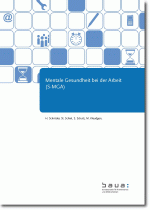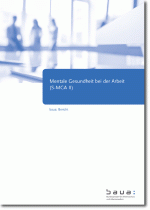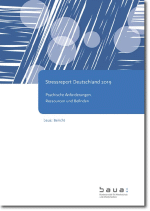A panel-study investigating the aetiological correlations between working conditions, mental health, work ability, and functioning
Background
The Mental Health at Work Study (Studie zur Mentalen Gesundheit bei der Arbeit, S-MGA) is investigating the correlations between working conditions, mental health, and functioning. It is designed as a panel study and is being conducted by the Federal Institute for Occupational Safety and Health (Bundesanstalt für Arbeitsschutz und Arbeitsmedizin, BAuA) in cooperation with the Institute for Employment Research (IAB). Various factors that affect participation in employment and how long people remain in working life are being investigated, including the influences of health, functioning, and working/employment conditions. The study is conceived as a broad survey based on an expanded understanding of mental health that takes account of positive indicators, functioning, and other considerations (see Mental Health and Cognitive Capacity). Furthermore, its design as a longitudinal panel survey with the same individuals being interviewed repeatedly makes it possible to thoroughly analyse employment biographies. The study is consequently helping to close the gaps in the research on this topic in Germany.
Practical significance of the study’s results
Findings on the correlations between work, health, functioning, and participation in employment enable policymakers to take evidence-based decisions about the labour market that sustainably maintain the employability of the largest possible proportion of the population. The knowledge acquired from the S-MGA can be used to design interventions and programmes that promote and preserve employability (prevention), for example by making it possible to gather and utilise evidence not just about dangerous working and employment conditions (e.g. bullying), but also about factors that promote good health.
The study’s results are interesting for the official bodies concerned with the labour market (employment agencies, jobcentres), pension insurance providers, and the German Statutory Accident Insurance (Deutsche Gesetzliche Unfallversicherung, DGUV), for instance on account of what they reveal about occupational medical examinations. Apart from helping people stay in working life longer, the study also delivers results of great relevance for the participatory opportunities open to individuals with limited functioning.
Methodology
Representative sample of the German population
The study's original statistical population was made up of employees who were paying compulsory social insurance contributions in Germany and had been born in the years from 1951 to 1980. The first wave of the S-MGA was carried out in 2011/2 as a representative baseline survey, with 4,511 people being questioned in computer-assisted interviews. The second wave followed in 2017 and saw 2,640 respondents from the baseline survey interviewed once again. The third wave is taking place currently (2023/4), the aim being to interview 8,000 first-time and 2,000 repeat respondents. More-detailed information about the sample, the survey instruments used, and further aspects of the project can be found in the data documentation published by BAuA’s Research Data Centre (Forschungsdatenzentrum, FDZ) and the methodological reports on the study (S-MGA I methodological report, S-MGA II methodological report).

Objective
S-MGA: waves I and II
In order to identify work-related risk factors for mental illness and resources that help people preserve their health, well-being, and work ability, then draw on the results to formulate recommendations for occupational safety and health provision, it is necessary to have a suitable data basis. This is provided by the Mental Health at Work Study. Our research on waves I and II has concentrated on three main priorities:
- Aetiological relationships between psychosocial workload, burnout, and depressive symptoms: In order to do justice to the complexity of working life, the study has, among other things, investigated which combinations of different loads are associated with clear increases in the risk of burnout and depressive symptoms. Work-related risk factors for work ability and functioning have also been identified.
- Positive indicators of mental health: Up until now only a few longitudinal studies have been undertaken that have attempted comprehensive, nuanced analyses of how positive mental health indicators (e.g. emotional well-being and work engagement) correlate with working and employment conditions and alterations in those conditions. The S-MGA has investigated in depth the interactions between work-related and personal demands and resources. The primary aim has been to identify resources that help to nurture and promote mental health.
- Correlations between mental health and participation in working life: It is an important social policy goal for people to participate in working life until they reach the statutory retirement age. Nevertheless, many employees give up their jobs prematurely. Research is needed to establish the central factors that jointly influence why people stop participating actively in work, leave employment, become permanently unemployed, and take early retirement. Indicators of mental health are of particular interest in this context. The long-term relationships between work, mental health, and participation in employment as well as the impacts of modern work activities on the mental strain experienced by employees stand at the heart of this thematic field.
Looking ahead to wave III: 2023/4
The data from the third wave of the survey are expected in the spring of 2024. The research priorities will include:
- Dynamic correlations: The aim is to shed light on temporal/dynamic correlations between work and mental health, work ability and functioning (e.g. start of impact, duration of impact)
- Socio-emotional exposure: Here, the focus will be placed on determining the influence of socio-emotional work factors (e.g. contact with customers, bullying and harassment, emotional demands, recognition from managers, social support, fairness, and respect) on subsequent health, work ability, and functioning
- Predictors for departure from working life: With each wave of interviews, the survey covers a growing number of respondents who have, for various reasons, left working life before the statutory retirement age. This is making it more statistically powerful for the analysis of factors that influence departure from employment.
- Predictors for transitions: Among other issues, it is to be investigated how working conditions and (mental) health act as triggers for changes in the number of hours employees work, switching between employers, (voluntary/involuntary) changes of occupation, sabbaticals, and parental leave.
- Digitalisation and its consequences: The research on this topic will look at the evolution of work-related social relationships and the associated working/employment conditions in a changing world of work.







